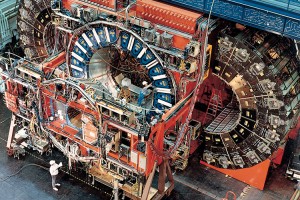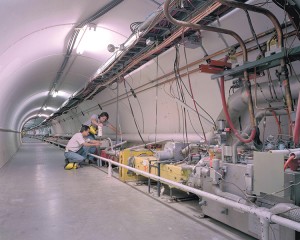W Boson Weighs in Heavy
Thursday, May 12th, 2022
A particle detector helps scientists study subatomic particles. Physicists at the Fermi National Accelerator Laboratory in Batavia, Ill., use this detector to record information about particles produced in collisions between beams of protons and beams of antiprotons.
Credit: Fermilab Visual Media Services
Particle physicists are buzzing about a hefty discovery. In April 2022, researchers at the Fermi National Accelerator Laboratory (also known as Fermilab) announced that a particle called the W boson appears to have slightly more mass than expected. Their results were published in the journal Science.
Bosons are particles that transmit forces between other particles. As particles go, bosons are much less popular than their cousins the fermions, which make up matter. The W boson carries the weak nuclear force, which is involved in the decay (breakdown) of some radioactive atoms.

A particle accelerator helps scientists study electricity and the building blocks of matter. The accelerator at the Fermi National Accelerator Laboratory in Batavia, Illinois, accelerates protons to almost the speed of light in an underground tunnel, shown here.
Credit: Fermi National Accelerator Laboratory
So who cares about a chunky boson? Physicists do. Modern physics is based largely on a theory called the Standard Model. The Standard Model includes a family tree of particles and can be used to make predictions about their properties. Most of these predictions have turned out to be highly accurate. A deviation in the mass of the W boson, if confirmed, could hint at the existence of unknown particles or other revisions to the Standard Model.
Physicists study particles in giant devices called particle accelerators. As the name suggests, these devices accelerate particles to extremely high speeds. They then smash them together to study any particles created in the collision.
The experiments in question were conducted in an accelerator called the Tevatron. The device smashed positively charged particles called protons into anti-protons, their antimatter counterparts. About one in 10 million such collisions create a W boson. It took the scientists 10 years to collect enough data.
The Tevatron was shut down in 2011. But it took another 10 years to properly analyze all that data. The results suggest that the W boson is 0.1 percent heavier than expected. That’s about as much as your weight might vary if measured before and after lunch. But for extremely precise particle measurements, it may be just enough to alter our understanding of the universe.



